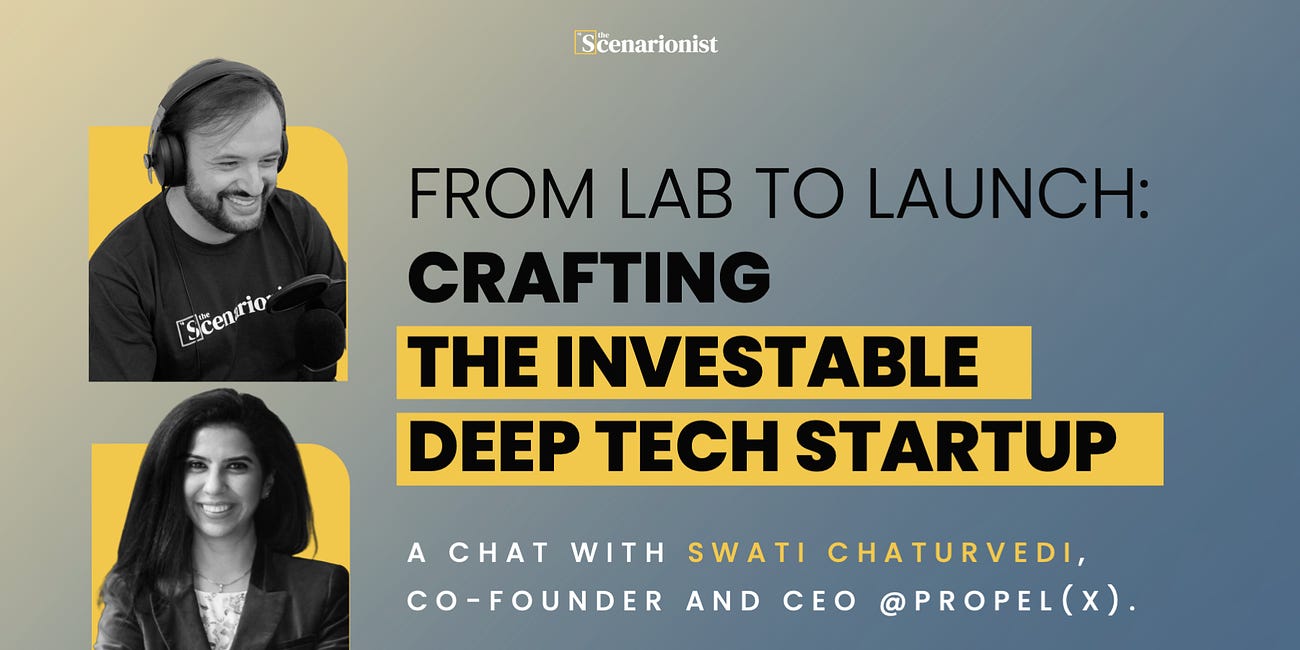Welcome back to Deep Tech Catalyst, the channel where science meets venture!
This time, we dive deep into the transition from scientist to startup CEO with Colin Webster, the Co-Founder of RiSC Capital.
Explore the transition from science to startup, focusing on the right time to seek venture capital, build a balanced team, and avoid common pitfalls in the Deep Tech entrepreneurial journey.
Perfect for scientists and investors alike, looking to navigate the complex world of frontier tech.
Let’s get started!
🎧 Prefer to listen?
🧱 Team Building 101 in Deep Tech Startups
Building a successful team is one of the most challenging yet crucial aspects of creating a Deep Tech startup. This is a complex and crucial process for founders. The reason it's so delicate lies in the need for a diverse set of skills and personalities that can complement each other, fostering innovation and growth. Deep Tech ventures, being at the intersection of cutting-edge technology and market demands, require a team that's not only technically proficient but also adept at navigating business challenges. Here are 2 takeaways to consider about it.
The Advantage of Having Multiple Founders
Having at least two founders in a Deep Tech startup is preferable for several reasons. First, it brings a broader range of skills and perspectives to the table, which is vital in tackling the multifaceted challenges of a startup.
Also, multiple founders can offer mutual support and share the workload, making the entrepreneurial journey less isolating and more manageable. Startups with single founders, particularly those led by scientists, often face more difficulties.
This is likely due to the additional challenges single founders face in covering all aspects of the business, from technical development to marketing and sales.
Balancing Soft Skills and Hard Skills
In a startup team, especially in Deep Tech, balancing soft skills with hard skills is essential. While technical expertise (hard skills) is the backbone of any Deep Tech venture, soft skills like communication, leadership, and adaptability are critical for business success. These skills become particularly important when dealing with investors, customers, and other stakeholders. It’s really important to find team members who complement their technical abilities with business acumen.
For a scientist-turned-entrepreneur, partnering with someone strong in business development or marketing can provide a well-rounded approach to building the startup. This balance ensures that the company not only advances technologically but also thrives in the competitive market environment.
🤼 Startup Team Relationship is an Asset for VCs
The relationship between founders is a critical aspect that investors scrutinize when evaluating a startup, especially in the high-stakes realm of Deep Tech. Here is an overview of what investors typically look for in a startup team and how they assess the dynamics between founders during due diligence.
Key Qualities Investors Seek in Startup Teams
Investors look for complementary skill sets among the founders. This includes a blend of technical expertise and business acumen. The ability of founders to work together effectively, communicate their vision, and demonstrate a shared commitment to the startup’s goals is crucial. Investors are keen on teams that can collaboratively tackle challenges and pivot when necessary. They look for evidence of a strong, cohesive partnership that can withstand the pressures and uncertainties of a startup journey.
Due Diligence in Assessing Founder Relationships
During the due diligence process, the investor’s focus extends beyond just the business plan and financial projections to the interpersonal dynamics of the founding team. This involves understanding how founders interact, make decisions, and resolve conflicts. Investors may look into the history of the founders' working relationship, seeking evidence of previous successful collaborations or how they have navigated past challenges. They also pay attention to the founders' communication during pitches and meetings, looking for signs of mutual respect, trust, and the ability to present a united front. This assessment helps investors gauge the resilience and long-term viability of the founding team, which is vital for the success of a Deeptech startup.
👩🔬 Why a Scientist Should Become an Entrepreneur?
Scientists should consider becoming entrepreneurs if they feel a strong desire to turn their scientific discoveries into real-world applications and make a significant impact on society.
To determine if they are suited for entrepreneurship from a scientific background, they should assess their willingness to take risks, their ability to adapt to uncertainty and ambiguity, and their passion for building and scaling a business.
The main activities of an entrepreneur from the scientific world include:
Identifying a market opportunity based on their scientific discoveries.
Developing a viable business plan and strategy.
Securing funding or investment for their startup.
Building a team with complementary skills.
Prototyping and developing their scientific innovation into a market-ready product.
Marketing and selling their product or service to customers.
Managing operations, finances, and growth.
Continuously learning and adapting to changing circumstances.
To understand if they are cut out for entrepreneurship from the scientific world, you should consider your ability to embrace challenges, handle setbacks, and learn from failures. You should also be prepared for a multidisciplinary role that involves not only scientific expertise but also business acumen, leadership, and interpersonal skills.
⏱ When to Approach a VC in Early-Stage Deep Tech?
Approaching venture capital for deep tech startups requires strategic understanding and market readiness. Scientific innovators need to have a clear vision and demonstrate their readiness to transition from research to a market-oriented approach. Here are some factors to consider.
1. The Entrepreneurial Shift for Scientists
Entrepreneurial motivation is paramount as scientists make the transition towards entrepreneurship. This shift entails embracing multifaceted challenges in company building rather than remaining solely in the lab. It necessitates a shift in mindset, moving from a researcher's role to that of a business innovator. This transformation is critical for those seeking to convert scientific discoveries into profitable ventures.
2. Proof of Concept (POC): Bridging Science and Market
Demonstrating the real-world viability and value of a scientific innovation through a proof of concept is essential. It transcends technical feasibility, encompassing market needs and potential customer interest. This step is pivotal for scientists eager to showcase the practical applications and market potential of their innovation.
3. Engaging Early Customers in Scientific Ventures
Initial customer engagement plays a vital role in validating a product within a real-world context. For scientific entrepreneurs, comprehending the product's value from a customer's perspective is imperative. Early feedback molds the product, ensuring it aligns with market requirements and offers a distinct value proposition.
4. Seed Funding Strategies for Scientific Innovators
When pursuing Seed funding, entrepreneurs must illustrate the potential market impact and profitability of their venture. A comprehensive pitch deck, evidence of market fit, and indications of interest from potential customers are essential. Venture capitalists seek innovations that address genuine market needs and possess revenue-generating potential.
5. Monetizing Scientific Innovation
The genuine value of a scientific entrepreneurial concept lies in its market viability and revenue-generating potential. Entrepreneurs must establish that their innovation addresses a bona fide market demand, with customers willing to pay for its value. This aspect is critical for scientists aiming to transform their innovations into successful businesses.
🧠 Food for Thoughts: Letter of Intent (LOI)
While immediate commitment from customers is not required, expressing interest in testing the prototype or product upon its readiness is valuable. This interest can be formalized through a letter of intent. Armed with their patent and a letter of intent, entrepreneurs should craft a compelling pitch deck and prepare to present their idea to potential investors, including VC firms.
⛔️ 3 Pitfalls Deep Tech Founders Should Avoid
Transitioning from a scientist to an entrepreneur in the Deep Tech sector comes with unique challenges and potential pitfalls. Understanding these common mistakes can guide scientists in successfully navigating the entrepreneurial landscape.
Avoiding Common Entrepreneurial Mistakes
One of the main mistakes a scientist must avoid when becoming an entrepreneur is over-prioritizing research and development at the expense of market engagement. Scientists often focus intensely on perfecting their technology, which can lead to overlooking the practical aspects of building a business. It’s important to balance technological development with market-oriented activities. Scientists need to avoid getting too absorbed in technical perfectionism, which can delay the introduction of their innovation to the market.
Prioritization in Early Stages
In the early stages of a Deep Tech startup, the critical focus should be on proving the concept's market viability and engaging with potential customers. Scientists need to prioritize activities that validate the market need for their innovation. This includes developing a minimal viable product (MVP) or prototype that can be tested in real-world scenarios. Early customer feedback is invaluable and can significantly shape the product’s development in a direction that aligns with market demands.
Importance of Bringing a Prototype to Market
Bringing a prototype to the market as soon as it is viable is crucial for several reasons. Firstly, it allows for early customer engagement and feedback, which is invaluable for refining the product. Secondly, it demonstrates to potential investors that the product has real-world applications and potential for revenue generation.
A startup with some level of market traction or revenue is in a stronger position to negotiate financing terms and valuation.
Investors are more confident in funding startups that show potential for market success, as evidenced by customer interest and early adoption. Therefore, getting a prototype to market swiftly can significantly impact the evaluation and negotiation of financing for a Deep Tech startup.
This is all for today! 👋
Wanna be more involved?
👉🏻 Follow our LinkedIn page and drop a DM!
👉🏻 Write us a line here: info@thescenarionist.org























